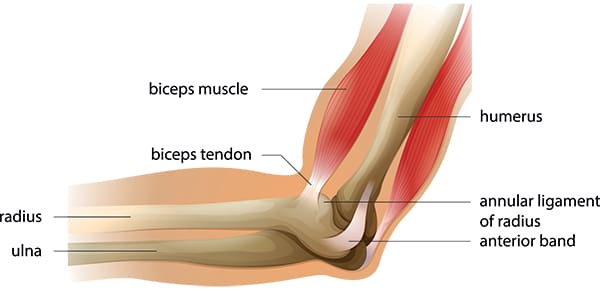Overstretching in the muscle can lead to strains, pulls, and fraying. As this damage progresses untreated, partial and complete tears can often develop within the biceps tendon.
Tears at the elbow often occur with sudden, extremely forceful loading of the hand, like attempting to pick up a pool table or catching the falling tailgate of a pickup truck.
Damage to the biceps tendon presents itself in the form of several common symptoms. Patients have described upper arm pain associated with tears as sharp and sudden, often accompanied by an audible pop or click. Pain and weakness can extend up to the shoulder or down through the elbow, and muscles can also become more susceptible to cramping. In many cases bruises or a visible bulge may appear above the elbow. As biceps injuries often coincide with other shoulder injuries, it’s both expected and important that your doctor conducts complete shoulder examinations, along with other physical exams, during the preparatory process.
In the event of a damaged or torn biceps tendon at the shoulder, non-surgical treatment is often suggested initially. Rest, Ice, physical therapy and anti-inflammatory medications are all proven to help limit pain and gradually minimize symptoms of an impaired biceps tendon. If pain and problems continue to arise, or in situations involving highly active people, arthroscopic surgery to repair or reattach the tendon is sometimes required.
If Dr. Torrez diagnoses a tear at the elbow, immediate surgical correction will be recommended.

